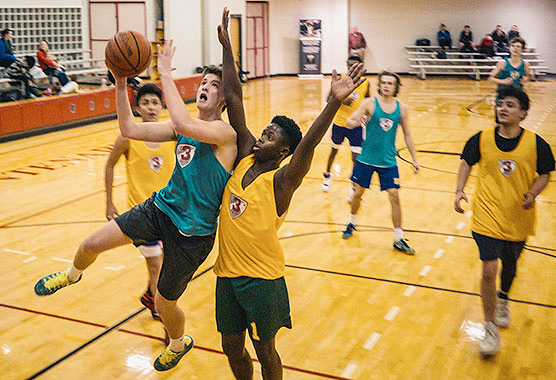Congenital Heart Disease and Exercise
Most children with congenital heart disease can benefit from exercise. Let our experts guide you.
Medically reviewed by Daniel Cortez, M.D. on June 21, 2023.

Partnering With You for Your Child’s Care
Physical activity has many benefits for children, including stronger bones, improved mental health and better weight management. Exercise can also reduce your child’s risk of chronic health conditions later in life.
For most children, including those with congenital heart disease, experts recommend 60 minutes of moderate-to-vigorous exercise every day. Congenital heart disease refers to abnormalities in the heart’s structure that are present at birth, also called congenital heart defects.
Specialists at UC Davis Health’s Pediatric Heart Center have extensive experience caring for children and adolescents with congenital heart disease. We offer tests to find out what activities are right for your child and personalized recommendations to help them be active.
When to Call Your Child's Physician
The benefits of exercise far outweigh the risks for most children with congenital heart defects. In rare cases, risks may include heart problems or blood clots.
Concerning Symptoms
Call your child's health care provider if they experience any of the following symptoms during exercise or after:
- Chest pain
- Dizziness or lightheadedness during exercise
- Irregular, fast or pounding heartbeats (palpitations)
- Leg swelling
- Nausea or vomiting
- Shortness of breath or fatigue that doesn’t go away after exercise
Exercise Testing for Congenital Heart Disease
Some conditions may require your child to be more cautious when they exercise or to limit physical activity. These limits depend more on how well your child’s heart works than the specific type of congenital heart disease.
Our skilled heart specialists review your child’s health and any history of heart-related symptoms such as:
- Chest pain
- Dizziness
- Fainting
Your child may have one or more tests to check their heart, including:
- Echocardiogram: The echocardiogram uses ultrasound imaging to create a video of your child’s heart. It allows us to see their heart structure, heartbeat and blood flow.
- Electrocardiogram (EKG): The EKG test measures the electrical signals that control your child’s heartbeat.
- Pulse oximetry: This test measures oxygen levels in your child’s blood.
We typically perform these tests while your child rests and again while they exercise. Exercise testing tells us how well their heart performs under stress (when it has to work harder). This information helps us determine the type and amount of activity that is safe.
Exercise Recommendations for Congenital Heart Disease
Children with congenital heart disease can engage in many sports and activities.
Good Activities for Children With Heart Conditions
A mix of moderate-to-vigorous aerobic exercise, muscle strengthening activities and flexibility training is safe for most children with heart disease.
Activities Children With Congenital Heart Disease Should Avoid
Avoiding high-intensity interval training (HIIT), contact sports or heavy weightlifting may be important, depending on your child’s medical history.
Monitoring Your Child During Exercise
Your physician may recommend helping your child monitor their heart rate during exercise. Staying within certain limits can help protect their heart from working harder than it should.
Getting Started the Right Way
When starting, teach your child to warm up with gentle stretching and light activity to increase their heart rate slowly.
Request an Appointment
As Sacramento's No. 1 hospital, you'll benefit from unique advantages in primary care and specialty care. This includes prevention, diagnosis and treatment options from experts in 150 specialties.
Referring Physicians
To refer a patient, submit an electronic referral form or call.
800-4-UCDAVIS
Patients
Call to make an appointment.
Consumer Resource Center
800-2-UCDAVIS

Ranked among the nation’s best hospitals
A U.S. News & World Report best hospital in cardiology, heart & vascular surgery, diabetes & endocrinology, ENT, geriatrics, neurology & neurosurgery, and pulmonology & lung surgery.

Ranked among the nation’s best children’s hospitals
U.S. News & World Report ranked UC Davis Children’s Hospital among the best in pediatric nephrology, orthopedics*, and pulmonology & lung surgery. (*Together with Shriners Children’s Northern California)

Ranked Sacramento’s #1 hospital
Ranked Sacramento’s #1 hospital by U.S. News, and high-performing in aortic valve surgery, back surgery (spinal fusion), COPD, colon cancer surgery, diabetes, gynecological cancer surgery, heart arrhythmia, heart failure, kidney failure, leukemia, lymphoma & myeloma, lung cancer surgery, pacemaker implantation, pneumonia, prostate cancer surgery, stroke, TAVR, cancer, orthopedics, gastroenterology & GI surgery, and urology.

The nation’s highest nursing honor
UC Davis Medical Center has received Magnet® recognition, the nation’s highest honor for nursing excellence.

World-class cancer care
One of ~59 U.S. cancer centers designated “comprehensive” by the National Cancer Institute.

A leader in health care equality
For the 13th consecutive year, UC Davis Medical Center has been recognized as an LGBTQ+ Healthcare Equality Leader by the educational arm of America’s largest civil rights organization.

